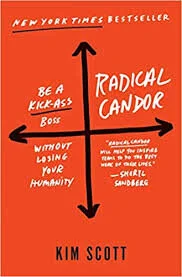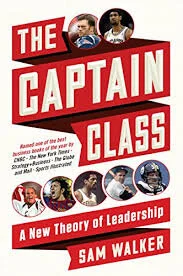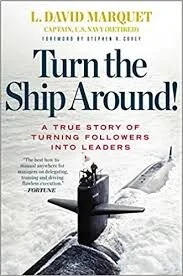If you want to Lead Happy, we highly recommend reading these books:
Radical Candor: Be a Kick-Ass Boss Without Losing Your Humanity - Kim Scott
With careers at companies like Apple, Google, and others, Kim Scott is a well respected leader and author. She does an incredible job integrating real stories from tech giants to reinforce her concepts. This keeps the book incredibly engaging and reads almost like a collection of novellas with massive educational benefits. Radical Candor was valuable to me by teaching me how to be direct with my reports. I found myself firmly in what she calls Ruinous Empathy without knowing it, but after reading this book I had a pivotal shift in my leadership style. I went from never wanting to be the bad guy, to being the best guy because not only did I care deeply for my people, but I was able to give them the constructive feedback they desperately needed.
Official Overview:
Radical Candor is a simple idea: to be a good boss, you have to Care Personally at the same time that you Challenge Directly. When you challenge without caring it’s obnoxious aggression; when you care without challenging it’s ruinous empathy. When you do neither it’s manipulative insincerity.
This simple framework can help you build better relationships at work, and fulfill your three key responsibilities as a leader: creating a culture of feedback (praise and criticism), building a cohesive team, and achieving results you’re all proud of.
Radical Candor offers a guide to those bewildered or exhausted by management, written for bosses and those who manage bosses. Taken from years of the author’s experience, and distilled clearly giving actionable lessons to the reader; it shows managers how to be successful while retaining their humanity, finding meaning in their job, and creating an environment where people both love their work and their colleagues.
Leaders Eat Last: Why Some Teams Pull Together and Others Don't - Simon Sinek
Simon Sinek is one of the foremost leadership and organizational culture authors and speakers in modern history. From the pen and page to the mic and TED stage, Simon challenges the status quo of leadership mindsets eloquently with research and anecdotally backed theories and perspective. Leaders Eat Last is no exception. He challenges traditional management theories such as the primacy of the shareholder, and makes an incredibly compelling case for the importance of putting your people first. The book remains constantly engaging with his use of real life stories like Johnny Bravo (a military pilot), Jack Welch (Former CEO, GE), and Jeff Sinegal (Former CEO, Costco), among many others. Leaders Eat Last contains much of what Lead Happy stands for. In fact, Simon Sinek’s philosophy is a huge contributor to the Lead Happy philosophy and shaped much of its development.
Official Overview:
Imagine a world where almost everyone wakes up inspired to go to work, feels trusted and valued during the day, then returns home feeling fulfilled. This is not a crazy, idealized notion. Today, in many successful organizations, great leaders create environments in which people naturally work together to do remarkable things.
In his work with organizations around the world, Simon Sinek noticed that some teams trust each other so deeply that they would literally put their lives on the line for each other. Other teams, no matter what incentives are offered, are doomed to infighting, fragmentation and failure. Why?
The answer became clear during a conversation with a Marine Corps general. "Officers eat last," he said. Sinek watched as the most junior Marines ate first while the most senior Marines took their place at the back of the line. What's symbolic in the chow hall is deadly serious on the battlefield: Great leaders sacrifice their own comfort--even their own survival--for the good of those in their care.
Too many workplaces are driven by cynicism, paranoia, and self-interest. But the best ones foster trust and cooperation because their leaders build what Sinek calls a "Circle of Safety" that separates the security inside the team from the challenges outside.Sinek illustrates his ideas with fascinating true stories that range from the military to big business, from government to investment banking.
The Captain Class: A New Theory of Leadership - Sam Walker
Sam Walker is The Wall Street Journal’s deputy editor for enterprise, the unit that directs the paper’s in-depth page-one features and investigative reporting projects. In The Captain Class, Sam starts by explaining his scientific approach to categorizing the highest performing sports teams in the world, and believe me, the bar is very high. He then investigates these teams for patterns in an attempt at unearthing common success factors. Before long an incredibly strong pattern emerged: team captains. Sam proceeds to break down exactly why these captains are the largest success factor for the most successful sports teams in history, and how they all share common core attributes. Though sports is the vehicle Sam uses, his findings and lessons can very easily be applied to teams of all kinds including business. In a world where flat organizations are the cool and trendy thing to do, Sam makes an argument that taking that methodology to the extreme may sacrifice important value that can be gleaned from “captains”.
Official Overview:
The seventeen most dominant teams in sports history had one thing in common: Each employed the same type of captain—a singular leader with an unconventional set of skills and tendencies. Drawing on original interviews with athletes, general managers, coaches, and team-building experts, Sam Walker identifies the seven core qualities of the Captain Class—from extreme doggedness and emotional control to tactical aggression and the courage to stand apart. Told through riveting accounts of pressure-soaked moments in sports history, The Captain Class will challenge your assumptions of what inspired leadership looks like.
The Infinite Game - Simon Sinek
Simon Sinek yet again turns conventional leadership thinking on its head and spins it like a bboy in the 80’s. If you thought you were “full” of knowledge after “digesting” Leaders Eat Last, you’d be wrong because unlike your favorite meal, learning never ends - or as Simon would say, it’s an infinite game. To win a game, you have to know the game you’re in, and unfortunately the game of business is not actually winnable…wait, what? The game of business never ends, there are no agreed upon rules, and there’s no one score that decides who takes the trophy - in fact there’s no trophy at all. So if you’re primary focus is on more features, better quality, a cheaper price, or more downloads than your competition, it’s sort of like playing chess using only checkers rules - if chess never ended and you couldn’t actually win. The only goal of the game of business is to stay in it and keep playing, and the only person you can hope to beat is yourself. Simon walks through exactly how to shift your organization as well as your thinking to center around a Just Cause in order to survive and thrive in the never-ending game of business. Like all his books he uses gripping examples that keep your fingers grabbing at the next page.
∞/∞ people would recommend.
Official Overview:
How do we win a game that has no end? Finite games, like football or chess, have known players, fixed rules and a clear endpoint. The winners and losers are easily identified. Infinite games, games with no finish line, like business or politics, or life itself, have players who come and go. The rules of an infinite game are changeable while infinite games have no defined endpoint. There are no winners or losers—only ahead and behind.
The question is, how do we play to succeed in the game we’re in?
In this revelatory new book, Simon Sinek offers a framework for leading with an infinite mindset. On one hand, none of us can resist the fleeting thrills of a promotion earned or a tournament won, yet these rewards fade quickly. In pursuit of a Just Cause, we will commit to a vision of a future world so appealing that we will build it week after week, month after month, year after year. Although we do not know the exact form this world will take, working toward it gives our work and our life meaning.
Leaders who embrace an infinite mindset build stronger, more innovative, more inspiring organizations. Ultimately, they are the ones who lead us into the future.
Turn the Ship Around: A True Story of Turning Followers Into Leaders - L. David Marquet
The military is a notoriously hierarchical organization, plagued with stories of well-intentioned but ultimately tragic orders coming from insulated rooms far away from the bullets and bandages. Submarines are no exception, and David Marquet found himself in the same “insulated” state, even though he was only feet from his men on the front-lines. Like a game of telephone, he discovered that by the time the front-line information traveled to him, he made a decision, and then it traveled back, it would often be the wrong call or worse, completely nonsensical. Short of learning how to do every single sailor’s job, the only option was instead of trying to tug-of-war the information up to his rank, he had to push the decision making power down to where the information was.
It’s a simple concept, but hard to practice without Marquet’s step-by-step outline of how to get it done. Order the book, read it, read it again, and then you might just have what it takes to create leaders at every level.
Official Overview:
Marquet was a Naval Academy graduate and an experienced officer when selected for submarine command. Trained to give orders in the traditional model of “know all–tell all” leadership, he faced a new wrinkle when he was shifted to the Santa Fe, a nuclear-powered submarine. Facing the high-stress environment of a sub where there’s little margin for error, he was determined to reverse the trends he found on the Santa Fe: poor morale, poor performance, and the worst retention rate in the fleet.
Almost immediately, Marquet ran into trouble when he unknowingly gave an impossible order, and his crew tried to follow it anyway. When he asked why, the answer was: “Because you told me to.” Marquet realized that while he had been trained for a different submarine, his crew had been trained to do what they were told—a deadly combination.
That’s when Marquet flipped the leadership model on its head and pushed for leadership at every level. Turn the Ship Around! reveals how the Santa Fe skyrocketed from worst to first in the fleet by challenging the U.S. Navy’s traditional leader-follower approach. Struggling against his own instincts to take control, he instead achieved the vastly more powerful model of giving control to his subordinates, and creating leaders.
Before long, each member of Marquet’s crew became a leader and assumed responsibility for everything he did, from clerical tasks to crucial combat decisions. The crew became completely engaged, contributing their full intellectual capacity every day. The Santa Fe set records for performance, morale, and retention. And over the next decade, a highly disproportionate number of the officers of the Santa Fe were selected to become submarine commanders.





